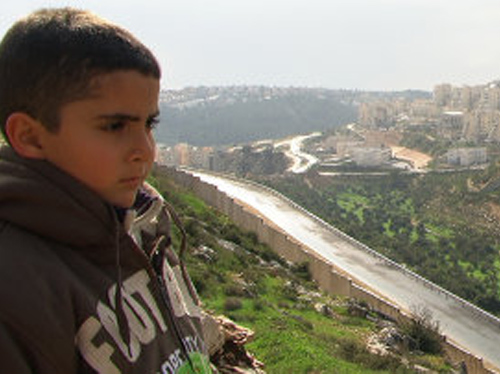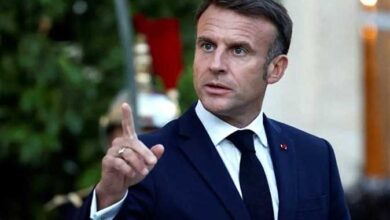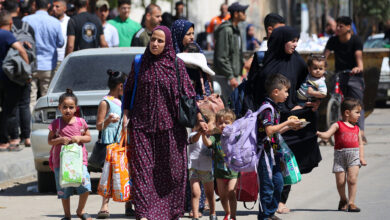
THESSALONIKI, Greece — Several Israeli and Israeli-Palestinian co-productions were screened over the past week as part of the 14th Thessaloniki Documentary Festival selection and AGORA, the festival’s film market.
Most of the films dealt in some way with the ongoing conflict in the occupied Palestinian territories. Some filmmakers chose to take a historical approach to promote their ideas, while others decided to focus on contemporary life in Palestine, tackling social and cultural aspects, while always going back to the political. A common theme in the documentaries seems to be promoting the two-state solution, which many of the young Israeli filmmakers see as the solution to the six-decade-old conflict with Palestinians.
Zionism and the two-state solution
In the Recordings of Memory program, two Israeli films were shown: “Hitler’s Children,” a German-Israeli co-production directed by Chanoch Ze’evi, and the Palestinian-Israeli production “Five Broken Cameras” by Emad Burnat and Guy Davidi.
“Hitler’s Children” goes down the much-trodden path of many Israeli films, fixating on the persecution and killing of Jews at the hands of the Nazi regime. Based on a number of interviews with the descendants of key figures in the Nazi regime — Himmler, Goering, and Hoss — the interviewees are asked to reflect on the legacy they grew up with.
The film plays on feelings of guilt and social stigma; the interviewees repeatedly apologize in front of the camera for the actions of their families. In one scene, the grandson of the head of the Auschwitz concentration camp agrees to go to the campsite on the anniversary of the Holocaust, where he meets several of the Jewish survivors’ grandchildren. When asked what he would do if he met his grandfather now, he responds: “I would kill him.”
Despite being a historical documentary, “Hitler’s Children” fails to make viewers feel for the Holocaust victims. It fails to add new insights on the incidents and comes off more propagandistic than revelatory, especially because much of the footage has been seen over the years in similar works promoted by the Israeli state.
In the film’s closing scene, a descendant of the survivors says that apologizing for what happened is not enough, and that the world must remember the Jews’ suffering forever. “Hitler’s Children” seems trapped in a historical tragedy yet fails to relate it to the tragedies of today. There is no mention or hint at how things changed for Jews, and the film completely overlooks the practices of the Israeli state against Palestinians and the latter’s long years of suffering.
“Five Broken Cameras” offers a more interesting storyline, tackling the confrontations between residents of Burnat’s village, west of Ramallah, and Israeli security forces over building the separation wall on their land. It is filmed through Burnat’s five cameras that were broken, one after the other, while filmmakers covered the demonstrations and resulting clashes. They were broken by the tear gas and rubber bullets used against the villagers.
Burnat started filming when the conflict started in 2005, and much of his personal life and professional practice are weaved into the story, like the birth of his youngest son Gabriel; viewers watch the little Gabriel bloom into a bright child raised on ideals of resistance. Burnat uses voice-over to guide viewers through the footage he filmed over the years, explaining his relationship to his village, family and the ongoing events.
This approach lends “Five Broken Cameras” human and political depth, with the camera symbolizing Burnat’s means of seeing a tragic and bloody reality and becoming a tool for resistance.
Although the confrontations in the film are sparked by his neighbors rejecting the construction of the wall on their land, this is but one facet of the problem, as Burnat notes in the film.
The clashes are a result of Palestinians living under occupation for over six decades, the constant violence draining a population so that many just hope to see the Oslo agreements implemented so that they can co-exist peacefully.
The Agora film market
In addition to the festival’s official selection, several films were screened as part of the Agora film market program, which attracted more than 55 documentary film producers and satellite channel representatives.
Among the films that stood out was the German-Israeli production “Cinema Jenin” by German filmmaker Marcus Vetter. The film tells the story of Vetter’s attempt to revive an abandoned movie theater in Jenin Camp in the West Bank, to make the city a cultural hub that promotes ideas of peace and coexistence.
The film makes some positive propositions in terms of reopening the movie theater with the help of European funders. It does, though, offer a specific political reading into the relationships between members of the Palestinian community, foreigners and Israelis, where they deal with one another pragmatically, yet with much suspicion. The cinema owners refuse to sign a contract with Vetter until he provides guarantees for monetary compensation.
“Cinema Jenin” also highlights existing tensions when several characters are accused of “normalization,” or becoming too Israel-friendly, such as Vetter’s translator, who runs the project for a while but quits after repeated attacks from members of the local community for screening Israeli movies at the local cinema.
“Ameer Got His Gun” by Naomi Levari tries to adopt a more neutral tone, although it still carries a lot of political baggage. The film tells the story of a young Israeli of Palestinian origins who decides to enlist in the Israeli army although he is exempt from military service. Ameer is seen as dangerous to Israel’s security and as a traitor among Palestinians. By following his journey and changing relationships with his community and Israelis, we see him constantly torn between his Palestinian origins and his Israeli passport. We see him trying to stop Israeli extremists from entering the Aqsa Mosque, leading him to the conclusion that peace is the only solution.
Eyal Sivan, ‘the troublemaker’
This year, the festival paid tribute to Israeli director Eyal Sivan, one of the key documentary filmmakers in Israel and the world. Sivan has been repeatedly criticized for opposing the Israeli state and uncovering untold stories about the construction of settlements on Palestinian land and the practices of Israeli society. He has been called “the troublemaker,” and received several death threats from extremist Zionists.
Last year, the festival screened his film “Jaffa, the Orange’s Clockwork,” which follows the story of the Jaffa citrus plantations to trace how farmland was ceased by the Israeli state to secure economic interests in the region. The fight is not solely ideological, but is part of the larger economic interests of super powers, leading to the much-cited phrase in Zionist literature: “A land without a people for a people without a land.”
The festival screened six films in tribute to Sivan this year.




